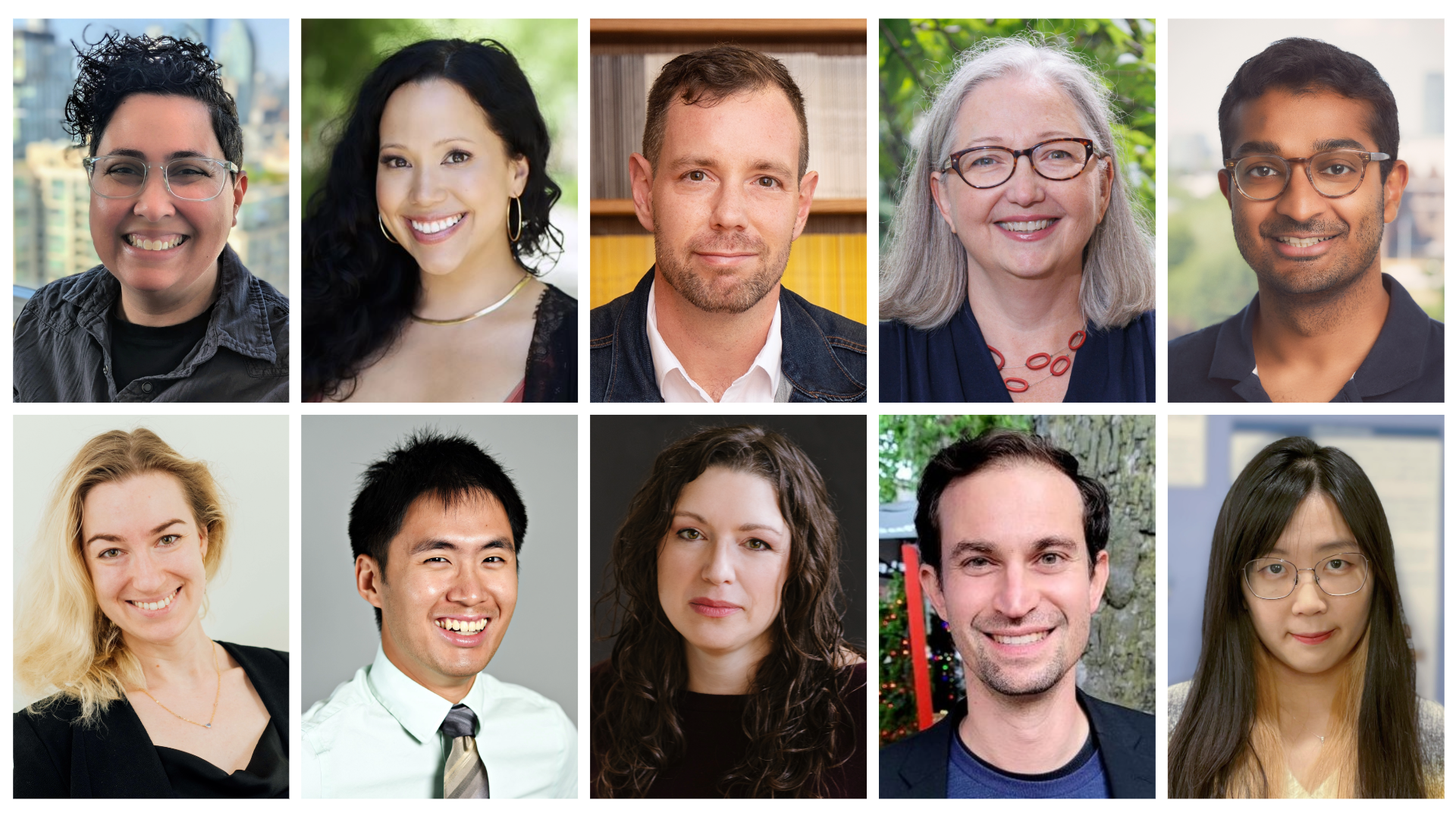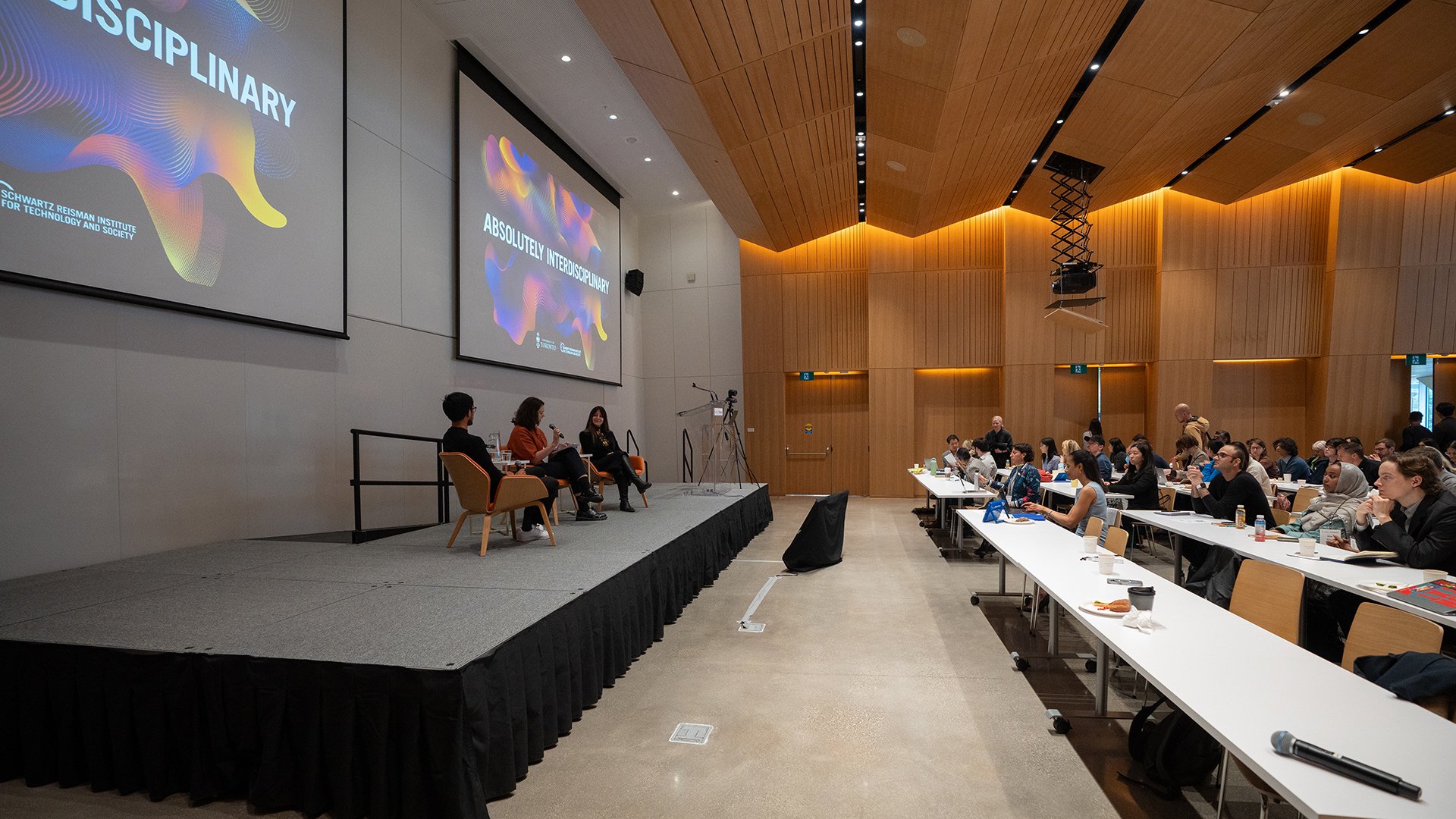New cohort of SRI faculty affiliates announced for 2024
A new cohort of ten faculty affiliates have been appointed by the Schwartz Reisman Institute from across the University of Toronto. From top left to bottom right: Sharla Alegria, Kristen Bos, Steven Coyne, Diane Horton, Rahul G. Krishnan, Anastasia Kuzminykh, David Liu, Bree McEwan, Joseph Jay Williams, and Ningning Xie.
The Schwartz Reisman Institute for Technology and Society (SRI) is pleased to announce the addition of 10 new faculty affiliates to its research community.
Hailing from across the University of Toronto, the new cohort of faculty affiliates brings an array of expertise from diverse fields including sociology, Indigenous studies, philosophy, and computer science, enriching the scope of research conducted by SRI’s vibrant community. At present, the Institute has 121 affiliated researchers from 37 different departments and faculties across the University, encompassing 20 unique disciplines.
SRI’s Faculty Affiliate program is one of the Institute’s cornerstone initiatives and aims to broaden and cultivate interdisciplinary approaches to understanding the impacts of technology on society. Faculty affiliates have the opportunity to engage in regular research programming and institutional activities, including conferences, seminars, workshops, and discussion groups. They also gain access to SRI’s extensive network of partners and communication platforms that help expand the reach and amplify the impact of their work.
Our new cohort of 2024 faculty affiliates are:
Sharla Alegria, assistant professor, Department of Sociology
Kristen Bos, assistant professor, Department of Historical Studies
Steven Coyne, assistant professor, teaching stream, Department of Philosophy
Diane Horton, professor, teaching stream, Department of Computer Science
Rahul G. Krishnan, assistant professor, Department of Computer Science
Anastasia Kuzminykh, assistant professor, Faculty of Information
David Liu, associate professor, teaching stream, Department of Computer Science
Bree McEwan, associate professor, Institute for Communication, Culture, Information and Technology
Joseph Jay Williams, assistant professor, Department of Computer Science
Ningning Xie, assistant professor, Department of Computer Science
Get to know our new affiliates:
Sharla Alegria is an assistant professor in U of T’s Department of Sociology, specializing in the social impacts of colonialism, racialization, Indigeneity, and gender. Alegria’s research examines how institutional structures can inadvertently perpetuate race and gender inequalities, how machine learning (ML) and artificial intelligence (AI) can reproduce existing inequalities, and how these technologies transform work. Alegria is part of a collaborative effort to develop sociological approaches to studying AI and is working with computer scientists to survey open-source software developers’ experiences about inclusion and discrimination.
Kristen Bos is an assistant professor of Indigenous science and technology studies at UTM’s Department of Historical Studies, with a graduate appointment in the Women and Gender Studies Institute. Bos co-directs the Indigenous-led Technoscience Research Unit, and was one of the Schwartz Reisman Institute’s inaugural faculty fellows. An urban Métis originally from northern Alberta, Bos delves deep into the connections between colonial, gendered, and environmental violence in her research, using traditions of Indigenous visual storytelling to reframe how technology is impacting the environment in ways that point towards new futures.
Steven Coyne is an assistant professor, teaching stream, in the Department of Philosophy with a cross-appointment to the Department of Computer Science, and is part of the Embedded Ethics Education Initiative (E3I) teaching team, a joint program developed by SRI and the Department of Computer Science which teaches ethics modules to computer science undergraduates. This year, 10,000 U of T students across 17 courses will participate in E3I modules or other programming which Coyne has co-developed with the E3I team, including extending the E3I model to other STEM disciplines including statistics, ecology and evolutionary biology, geography, and actuarial science. Coyne’s research explores moral and political philosophy, with a focus on how speech acts influence others, the moral and normative effects of civil disobedience, and ethics of technology. In addition to his teaching, Coyne leads an ethics of technology reading group that explores contemporary issues in AI ethics.
Diane Horton is a professor, teaching stream, in the Department of Computer Science and is one of the Embedded Ethics Education Initiative’s three faculty leads. In her research, Horton has conducted experiments to evaluate various pedagogical methods and interventions, including assessing the impact of flipped classroom models and comparing online versus face-to-face instruction. Since the inception of the E3I program in 2020, Horton has co-authored three publications evaluating the program’s impact and is guiding the design of course content—which covers critical issues like privacy, manipulation, consent, bias, and distributive justice—to help ensure that every U of T computer science graduate is educated to consider the societal impact of their work. “I find multi-disciplinary work both fascinating and deeply rewarding,” Horton says. “I greatly enjoy doing research whose results can be directly applied in my own teaching, as well as that of my colleagues here and around the world.”
Rahul G. Krishnan is an assistant professor in the Department of Computer Science, with a secondary appointment in the Department of Laboratory Medicine and Pathobiology. His primary research focuses on blending computer science with medicine. By utilizing probabilistic modeling, causal inference, and machine learning, Krishnan is dedicated to developing a learning health system. This system will leverage digitized clinical and biological data to enhance clinical care and advance the understanding of human and disease biology. “My work on creating computational tools to detect model failures connects with SRI’s mandate to ensure the safe and trustworthy deployment of machine learning and AI,” Krishnan explains.
Anastasia Kuzminykh is an assistant professor at the Faculty of Information, where she specializes in human-computer interaction and information dynamics. Central to her research is examining how users perceive AI systems and how this impacts information exchange. Kuzminykh focuses on designing ethical and efficient human-AI collaboration, leveraging technologies such as conversational agents, generative AI, and AI-based decision support systems. In addition to her research, Kuzminykh is the director of The COoKIE Group, an interdisciplinary human-computer interaction research group, and the founder of the Toronto Human-AI Interaction Research School.
David Liu is an associate professor, teaching stream, in the Department of Computer Science, and a faculty co-lead of the E3I program. In addition to his leadership with the E3I program, Liu has developed and taught introductory computing and data science courses in partnership with various other units in U of T’s Faculty of Arts & Science, including statistics, English, geography and planning, chemistry, ecology and evolutionary biology, and human biology. “By helping bring computing and data science education to a wider range of students outside of my department, I aim to increase the number of students, and graduates, who will participate in future industries, research, and policy discussions about how data and society are interacting with technological advancements,” Liu observes.
Bree McEwan is an associate professor at the Institute for Communication, Culture, Information and Technology, with a secondary appointment in the Tri-Campus Sociology Graduate Program. She is also an executive board member of the Data Sciences Institute. McEwan’s research explores how humans utilize social technologies for relational purposes, and has been published across various fields, including communication, sociology, and social psychology. Her recent work delves into social interaction within virtual reality (VR) settings, and she is particularly interested in questions related to how humans engage with and comprehend large language models and generative AI technologies in a VR context.
Joseph Jay Williams is an assistant professor in the Department of Computer Science, with a graduate appointment in the Departments of Psychology and Statistics. Williams leads the Intelligent Adaptive Interventions Lab, which combines human-computer interaction, cognitive science, and machine learning approaches. Dedicated to creating intelligent self-improving systems that dynamically adapt through personalized, collaborative experimentation, Williams aims to harness software to address societal challenges in education, health, and the economy. “Solving the most challenging societal problems requires a deep understanding of human behaviour, which often does not yet exist. I aim to tackle problems that are too complex to solve without doing research into real-world human cognition,” he says.
Ningning Xie is an assistant professor in the Department of Computer Science and a research scientist at Google DeepMind. Her research is focused on programming languages, particularly in the areas of functional programming, type systems, logics, and applications in domains such as compilers, code generation, and machine learning. Her recent projects involve language design for ML programming, including developing new techniques for library development. “The intersection of programming languages and machine learning is an important direction for future technologies, since many aspects of effectiveness, safety, and fairness could be embedded in a system in the design phase via expressive programming language techniques,” Xie observes. “I hope to explore this direction further and connect with other researchers at the Institute.”


















